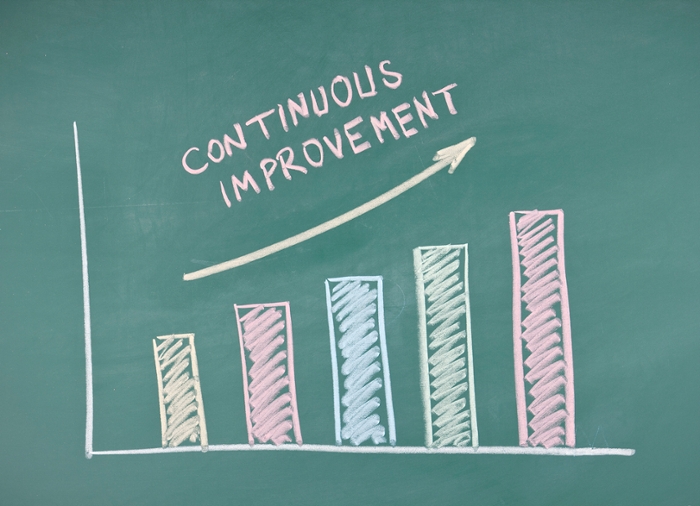Are you seeing inefficiencies within your company? Wondering what might be reducing revenue? Are processes slowing down production? Is employee morale low? Lean Six Sigma (LSS) might be an answer to helping improve procedures, performance, and ROI.
“Companies have saved millions of dollars with this (LSS) approach and anyone can do it,” said Bob Myers, Lecturer in Operations Management at the Georgia Tech Scheller College of Business. Myers is a Lean Six Sigma Black Belt with over 22 years of experience in process improvement methodology.
What is Lean Six Sigma?
Lean Six Sigma is a methodology that combines Lean with Six Sigma to identify weakness in an organization’s processes and, by applying LSS tools and techniques, helps streamline operations, decrease waste, and increase employee engagement.
Lean Six Sigma isn’t new. Lean started at Toyota in the ‘50s and Six Sigma started at Motorola in 1986 with a focus on reducing variation in a process. According to Myers, by applying Lean Six Sigma tools, Motorola saw only 3.14 defects per million opportunities. When the U.S. Army applied LSS to their processes, they saved over 2 billion dollars.
There’s no doubt that adopting LSS techniques will increase profits, employee morale, and quality of products or services. But are executives the only ones who can apply LSS methodologies to improve overall performance in their organization? According to Myers, the answer is no. “People who are dissatisfied with the current state of their company but want to see it succeed need the tools to make effective and positive change. This means that a person can be a front-line employee or C-suite individual,” he said.
Why should I get a certification in Lean Six Sigma?
Lean Six Sigma methodologies can be applied across many industries including manufacturing, supply chain, finance, healthcare, engineering, construction and more. The focus is on creating financial returns that are quantifiable and measurable, building a stronger management team intent on rectifying wastes, and replacing assumptions with statistical methods and data, regardless of industry. Individuals who get their LSS certification increase their value as employees to current and potential employers.
What is the difference between a Green Belt and Black Belt certification?
“Basically, the lower the belt, the less information or ability one has mastered,” said Myers. He suggests going for a Green or Black Belt as these carry more weight and you don’t need to work your way through each belt to become certified. What’s the difference between a Green and a Black Belt? According to Myers, a Green Belt provides the fundamentals needed to apply LSS and a Black Belt adds the DMADV (Define, Measure, Analyze, Improve, and Control) framework and more proficiency in methodologies.
What can I expect from a Lean Six Sigma program?
Georgia Tech Scheller offers Lean Six Sigma programs for those seeking a Green or Black Belt and the curriculum is considered more robust than those offered by other organizations. As a seasoned instructor, Myers conducts classes for both certifications and follows what he calls ‘Learn-See-Do.’ “The beauty is that it supports multiple learning styles and really helps students understand concepts. It starts with a traditional presentation of material (Learn), then an example problem or business case that shows a real company (See). This is followed up with a hands-on activity using the tools just presented and shown through a case (Do),” he explained.
The programs will be offered virtually with a mix of individual and group exercises and live video time with Myers. “This is not a program full of pre-recorded material. We cover all the standard concepts found in Lean Six Sigma programs plus concepts not found in other external programs. For example, we show how to leverage the Theory of Constraints in conjunction with LSS to maximize ROI. And since it’s a Georgia Tech program, you know we are going to give you the math,” Myers states. He continued, “Students will understand not only how to conduct a Lean Six Sigma initiative, but how to document and present the findings and cost/revenue implications of the project. They will walk away with experience doing these projects,” he said.
When and where can I get my certification?
Georgia Tech Scheller offers two certifications in Lean Six Sigma: Green Belt and Black Belt. The new online programs kick off in February 2021, with class days broken up between coursework in the morning and project work in the afternoon. Since the programs are virtual, you don’t need to be in Atlanta to participate and can still receive one-on-one coaching as well as group interactions without being on campus.
Check with your employer to see if they offer tuition reimbursement. As an individual, you may be able to write off some or all your tuition through federal tax breaks for professional development activities.
Registration opens in the next few weeks. If you or someone you know is interested in learning more, visit Scheller Lean Six Sigma Certification.
